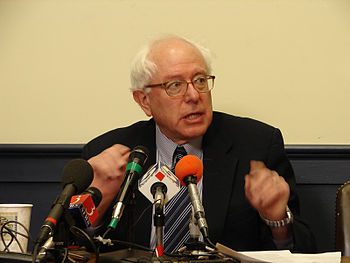
The first “top ten” Republican presidential nomination debate consisted almost entirely of empty calories, and it’s easy to see why. The event was put on by Fox “News,” its dominating presence was Donald Trump, and its focus was, simply, on who could get most militaristic about Iran and immigration.
Issues of substance? Fuhgeddaboudit … except for one brief exchange between New Jersey governor Chris Christie and former Arkansas governor (and Fox talk show host) Mike Huckabee. Between the two of them, they revealed the narrow and dangerous range of thinking on the future of Social Security that characterizes both major American political parties. Even Bernie Sanders, allegedly a fire-breathing socialist, can’t seem to think outside that range on Social Security. A quick roundup of the positions:
Huckabee thinks that Social Security can and should be “saved” by switching from progressive federal income taxation to the “Fair” Tax, a 30% national sales tax.
Christie thinks that Social Security can and should be “saved” by increasing the retirement age by two years over a period of 25 years (i.e. every year or so, the retirement age goes up by one month) and “means testing” (i.e. stopping Social Security checks to senior citizens with retirement incomes in excess of $200k and $4 million in liquid assets).
Sanders thinks that Social Security can be “saved” by un-capping the tax that supports it. Right now, only the first $118,500 of each individual’s income is taxed for Social Security purposes. Sanders wants to remove that ceiling.
Social Security has long, and rightly, been characterized as the “third rail” of American politics. Those who touch it tend to die spectacularly gruesome political deaths. It has to be talked about, but nobody’s willing to talk about it outside the context of “saving” it.
That fear may be justified, but it’s also incredibly bad for America.
The ratio of retirees to current tax-paying workers is inverting — Baby Boomers are retiring, having had fewer children than their own parents.
Social Security’s “trust fund” consists entirely of IOUs from a government already more than $18 trillion in debt and showing no signs of ever learning fiscal responsibility.
None of the gimmicks proposed by the likes of Huckabee, Christie and Sanders changes those fundamentals. Even Social Security’s trustees predict insolvency by 2035, and their bookkeeping looks suspiciously optimistic.
Here’s what the politicians don’t want to tell you: Social Security is going to end.
Even if the US government hadn’t operated it as a Ponzi scheme, spending its revenues and paying old claims from new revenues, the demographic changes of the last 50 years would have made it untenable. And even absent those demographic changes, well, Ponzi schemes always collapse sooner or later.
It’s going to end. The only choice is whether it ends with a bang (total collapse and sudden mass destitution among the elderly) or a whimper (phasing it out with minimum possible harm to those counting on it).
Any politician who tells you otherwise is lying to you.
Thomas L. Knapp is director and senior news analyst at the William Lloyd Garrison Center for Libertarian Advocacy Journalism (thegarrisoncenter.org). He lives and works in north central Florida.
AUDIO VERSION
PUBLICATION/CITATION HISTORY
- “Social Security: An Inconvenient Truth,” by Thomas L. Knapp, Ventura County, California Citizens Journal, 08/09/15
- “Social Security: An inconvenient truth,” by Thomas L. Knapp, Davenport, Iowa Quad-City Times, 08/09/15
- “Social Security: An inconvenient truth,” by Thomas L. Knapp, Muscatine, Iowa Journal, 09/09/15
- “Social Security: An Inconvenient Truth,” by Thomas L. Knapp, Alliance, Nebraska Times-Herald (print edition), 08/10/15
- “Here’s an inconvenient truth on topic of Social Security,” by Thomas L. Knapp, Montgomery, West Virginia Herald, 08/12/15
- “The truth about Social Security … its end is near,” by Thomas L. Knapp, Scottsdale, Arizona Independent, 08/13/15
- “Social Security — An Inconvenient Truth,” by Thomas L. Knapp, Iowa Free Press, 08/13/15
- “Social Security: an inconvenient truth,” by Thomas L. Knapp, Orangeburg, South Carolina Times and Democrat, 08/16/15


